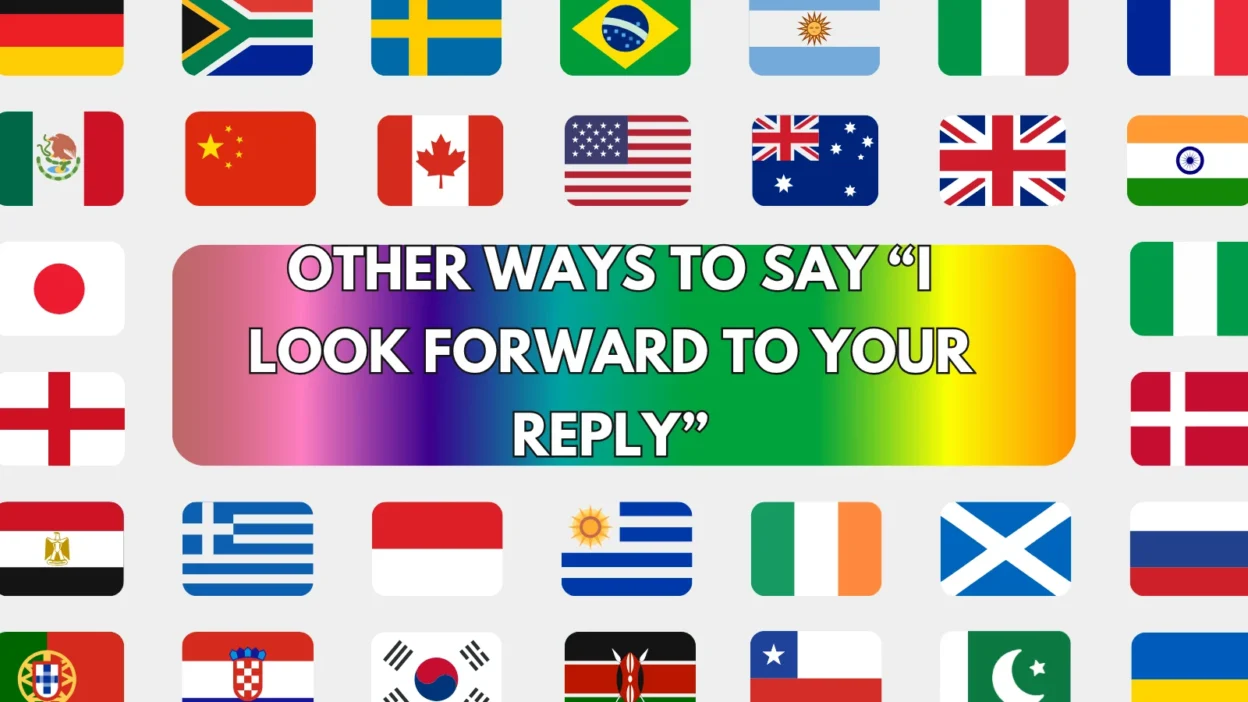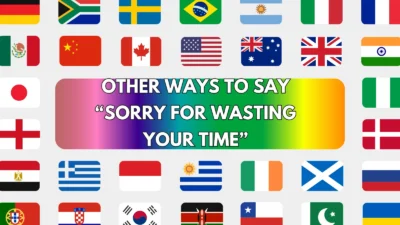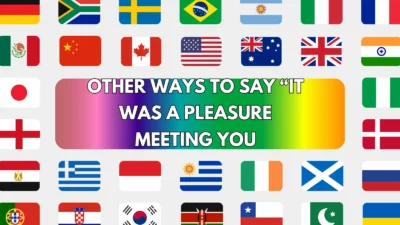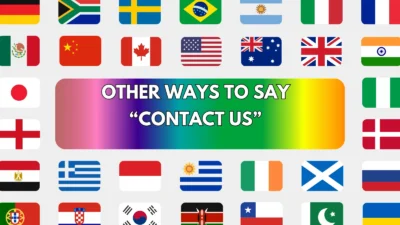When you’re writing an email, ending with “I look forward to your reply” is polite and professional — but it can sound repetitive if you use it often. Luckily, there are many other ways to express the same sentiment while keeping your tone courteous, confident, and engaging. Whether you’re writing to a client, colleague, or hiring manager, choosing the right phrase helps you leave a positive final impression.
Here are 25 professional alternatives to “I look forward to your reply,” with meanings, best uses, and examples.
1. I look forward to hearing from you
Meaning: A warm and professional closing that invites a response.
Detailed Explanation: This is the most common alternative — simple, polite, and effective.
Scenario Example: I look forward to hearing from you soon regarding the proposal.
Best Use: Business emails, job applications, client communication.
Tone: Polite, formal.
2. I await your response
Meaning: Shows anticipation and respect for their reply.
Detailed Explanation: Works well in more formal or official settings.
Scenario Example: I await your response to finalize the next steps.
Best Use: Corporate or official emails.
Tone: Professional, respectful.
3. I’m eager to hear your thoughts
Meaning: Suggests enthusiasm for feedback or collaboration.
Detailed Explanation: Perfect when seeking opinions or creative input.
Scenario Example: I’m eager to hear your thoughts on the draft presentation.
Best Use: Collaborative or team communication.
Tone: Friendly, open.
4. I’m looking forward to your feedback
Meaning: Invites review or input on something shared.
Detailed Explanation: Emphasizes your willingness to improve or engage.
Scenario Example: I’m looking forward to your feedback on the latest design.
Best Use: Creative projects, internal reviews.
Tone: Constructive, inviting.
5. I hope to hear from you soon
Meaning: Expresses hope for a prompt reply.
Detailed Explanation: Gentle and polite without being pushy.
Scenario Example: I hope to hear from you soon about the meeting schedule.
Best Use: Professional follow-ups or initial outreach.
Tone: Warm, professional.
6. I’ll be waiting for your response
Meaning: Indicates expectation while remaining respectful.
Detailed Explanation: Slightly more assertive than “hope to hear.”
Scenario Example: I’ll be waiting for your response to confirm the arrangement.
Best Use: When timelines are involved.
Tone: Courteous, confident.
7. Please let me know your thoughts
Meaning: Encourages an open reply.
Detailed Explanation: Feels conversational and easygoing.
Scenario Example: Please let me know your thoughts once you review the proposal.
Best Use: Everyday office communication.
Tone: Polite, approachable.
8. I’m anticipating your response
Meaning: Expresses polite eagerness for communication.
Detailed Explanation: Suitable for follow-ups or pending approvals.
Scenario Example: I’m anticipating your response regarding the final quote.
Best Use: Business correspondence, proposals.
Tone: Formal, professional.
9. I look forward to your feedback
Meaning: Shows you value their opinion or expertise.
Detailed Explanation: Invites engagement without pressure.
Scenario Example: I look forward to your feedback on the latest report.
Best Use: Collaborative projects, client reviews.
Tone: Respectful, engaging.
10. I appreciate your time and response
Meaning: Combines gratitude with expectation of a reply.
Detailed Explanation: Excellent for professional closings that sound thankful.
Scenario Example: I appreciate your time and response regarding this matter.
Best Use: Formal emails, polite correspondence.
Tone: Grateful, professional.
11. I’m awaiting your feedback
Meaning: Formally communicates that you expect a reply.
Detailed Explanation: Works best when deadlines are involved.
Scenario Example: I’m awaiting your feedback to proceed with the next phase.
Best Use: Business or project discussions.
Tone: Direct, formal.
12. I hope to hear back from you
Meaning: Casual and friendly alternative.
Detailed Explanation: Suitable for less formal relationships.
Scenario Example: I hope to hear back from you soon about the schedule.
Best Use: Internal team emails or familiar contacts.
Tone: Light, approachable.
13. Please get back to me at your earliest convenience
Meaning: Politely asks for a response when they have time.
Detailed Explanation: Balances professionalism with flexibility.
Scenario Example: Please get back to me at your earliest convenience regarding the document.
Best Use: Formal or client emails.
Tone: Polite, patient.
14. I’m excited to hear your thoughts
Meaning: Shows enthusiasm and positivity.
Detailed Explanation: Perfect for creative or collaborative communication.
Scenario Example: I’m excited to hear your thoughts on this new idea.
Best Use: Creative, marketing, or team discussions.
Tone: Friendly, enthusiastic.
15. Looking forward to your input
Meaning: Invites collaboration and shared decision-making.
Detailed Explanation: Works well when multiple opinions are valued.
Scenario Example: Looking forward to your input before we finalize the plan.
Best Use: Group or team emails.
Tone: Collaborative, professional.
16. I look forward to your confirmation
Meaning: Politely requests acknowledgment or approval.
Detailed Explanation: Great for logistics, meetings, or bookings.
Scenario Example: I look forward to your confirmation of the appointment.
Best Use: Scheduling and project coordination.
Tone: Formal, clear.
17. Please let me know your decision
Meaning: Requests a specific reply or conclusion.
Detailed Explanation: Clear and straightforward for pending matters.
Scenario Example: Please let me know your decision regarding the proposal.
Best Use: Negotiations, offers, approvals.
Tone: Professional, direct.
18. I’ll wait for your go-ahead
Meaning: Indicates readiness to act once they respond.
Detailed Explanation: Useful when awaiting approval or instructions.
Scenario Example: I’ll wait for your go-ahead before moving forward.
Best Use: Project management, teamwork.
Tone: Respectful, proactive.
19. I trust to hear from you soon
Meaning: Classic and polite phrasing, common in formal letters.
Detailed Explanation: Slightly traditional but still professional.
Scenario Example: I trust to hear from you soon regarding my application.
Best Use: Formal business or job emails.
Tone: Polite, traditional.
20. I’d appreciate your quick response
Meaning: Encourages timely communication.
Detailed Explanation: Perfect when urgency matters but tone must remain polite.
Scenario Example: I’d appreciate your quick response to meet the project deadline.
Best Use: Urgent follow-ups.
Tone: Courteous, prompt.
21. Your feedback will be greatly appreciated
Meaning: Emphasizes gratitude for their response.
Detailed Explanation: Adds warmth to a professional tone.
Scenario Example: Your feedback will be greatly appreciated before we finalize this version.
Best Use: Team or client communications.
Tone: Appreciative, kind.
22. I’ll look out for your response
Meaning: Friendly and conversational.
Detailed Explanation: Works well in casual professional relationships.
Scenario Example: I’ll look out for your response later today.
Best Use: Everyday correspondence.
Tone: Relaxed, positive.
23. I’m keen to hear your opinion
Meaning: Highlights genuine interest in their viewpoint.
Detailed Explanation: Great for discussions or brainstorming sessions.
Scenario Example: I’m keen to hear your opinion on the new campaign direction.
Best Use: Team collaborations.
Tone: Friendly, open-minded.
24. I hope we can connect soon
Meaning: Suggests continued communication or discussion.
Detailed Explanation: Works when awaiting a meeting or call rather than an email reply.
Scenario Example: I hope we can connect soon to discuss the proposal in more detail.
Best Use: Networking, scheduling.
Tone: Warm, professional.
25. I appreciate your attention to this matter
Meaning: Thanks the reader for taking time to review your message.
Detailed Explanation: Perfect for formal or serious emails.
Scenario Example: I appreciate your attention to this matter and await your reply.
Best Use: Legal, administrative, or corporate contexts.
Tone: Formal, courteous.
Conclusion
Closing an email the right way strengthens your communication and leaves a lasting impression. Instead of repeating “I look forward to your reply,” you can choose phrases that better match your intent — whether it’s polite, enthusiastic, urgent, or collaborative.
Simple alternatives like “I look forward to hearing from you,” “Please let me know your thoughts,” or “I appreciate your time and response” help you sound confident, considerate, and professional in every situation.

Hadi Bhatti is a passionate writer and content creator at Saypadia, known for turning complex words, phrases, and internet slang into simple, easy-to-understand explanations. With a strong interest in language, meanings, and digital communication, Hadi focuses on helping readers understand what words really mean in everyday use. His writing style is clear, engaging, and user-focused, making learning both practical and enjoyable.




